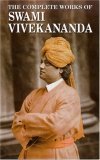More on this book
Community
Kindle Notes & Highlights
"We Hindus do not merely tolerate, we unite ourselves with every religion, praying in the mosque of the Mohammedan, worshipping before the fire of the Zoroastrian, and kneeling to the cross of the Christian. We know that all religions alike, from the lowest fetishism to the highest absolutism, are but so many attempts of the human soul to grasp and realise the Infinite. So we gather all these flowers, and, binding them together with the cord of love, make them into a wonderful bouquet of worship."
says Vivekananda, "Man is not travelling from error to truth, but climbing up from truth to truth, from truth that is lower to truth that is higher." This, and the teaching of Mukti — the doctrine that "man is to become divine by realising the divine," that religion is perfected in us only when it has led us to "Him who is the one life in a universe of death, Him who is the constant basis of an ever-changing world, that One who is the only soul, of which all souls are but delusive manifestations" —
the Ishta Devatâ, the right of each soul to choose its own path, and to seek God in its own way. No army, then, carries the banner of so wide an Empire as that of Hinduism, thus defined. For as her spiritual goal is the finding of God, even so is her spiritual rule the perfect freedom of every soul to be itself.
the Swami adjures all to aid him in the building of a temple wherein every worshipper in the land can worship, a temple whose shrine shall contain only the word Om, there are some of us who catch in the utterance the glimpse of a still greater temple
the many and the One are the same Reality, perceived by the mind at different times and in different attitudes; or as Sri Ramakrishna expressed the same thing, "God is both with form and without form. And He is that which includes both form and formlessness."
To him, the workshop, the study, the farmyard, and the field are as true and fit scenes for the meeting of God with man as the cell of the monk or the door of the temple. To him, there is no difference between service of man and worship of God, between manliness and faith, between true righteousness and spirituality. All his words, from one point of view, read as a commentary upon this central conviction. "Art, science, and religion", he said once, "are but three different ways of expressing a single truth. But in order to understand this we must have the theory of Advaita."
In his Master, Ramakrishna Paramahamsa, living and teaching in the temple-garden at Dakshineshwar, the Swami Vivekananda — "Naren" as he then was — found that verification of the ancient texts which his heart and his reason had demanded.
The discoverers of these laws are called Rishis, and we honour them as perfected beings. I am glad to tell this audience that some of the very greatest of them were women. Here it may be said that these laws as laws may be without end, but they must have had a beginning. The Vedas teach us that creation is without beginning or end. Science is said to have proved that the sum total of cosmic energy is always the same. Then, if there was a time when nothing existed, where was all this manifested energy? Some say it was in a potential form in God. In that case God is sometimes potential and
...more
The Hindu religion does not consist in struggles and attempts to believe a certain doctrine or dogma, but in realising — not in believing, but in being and becoming.


